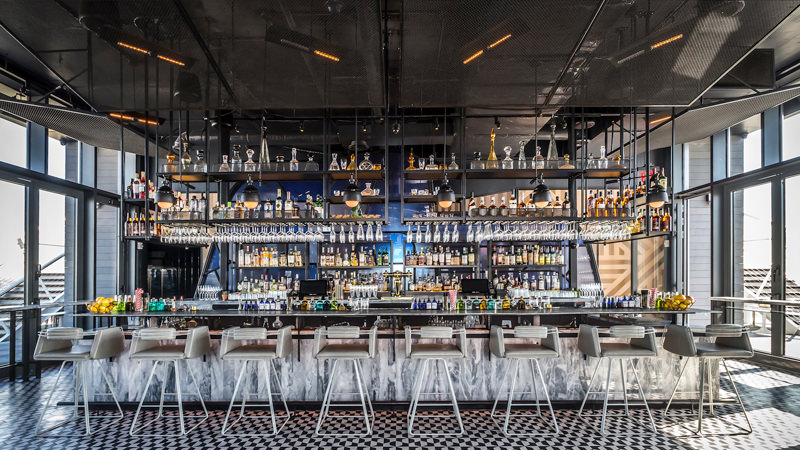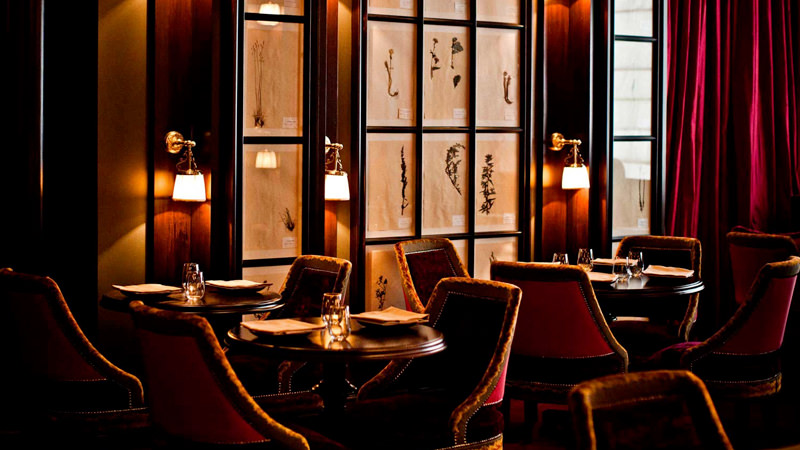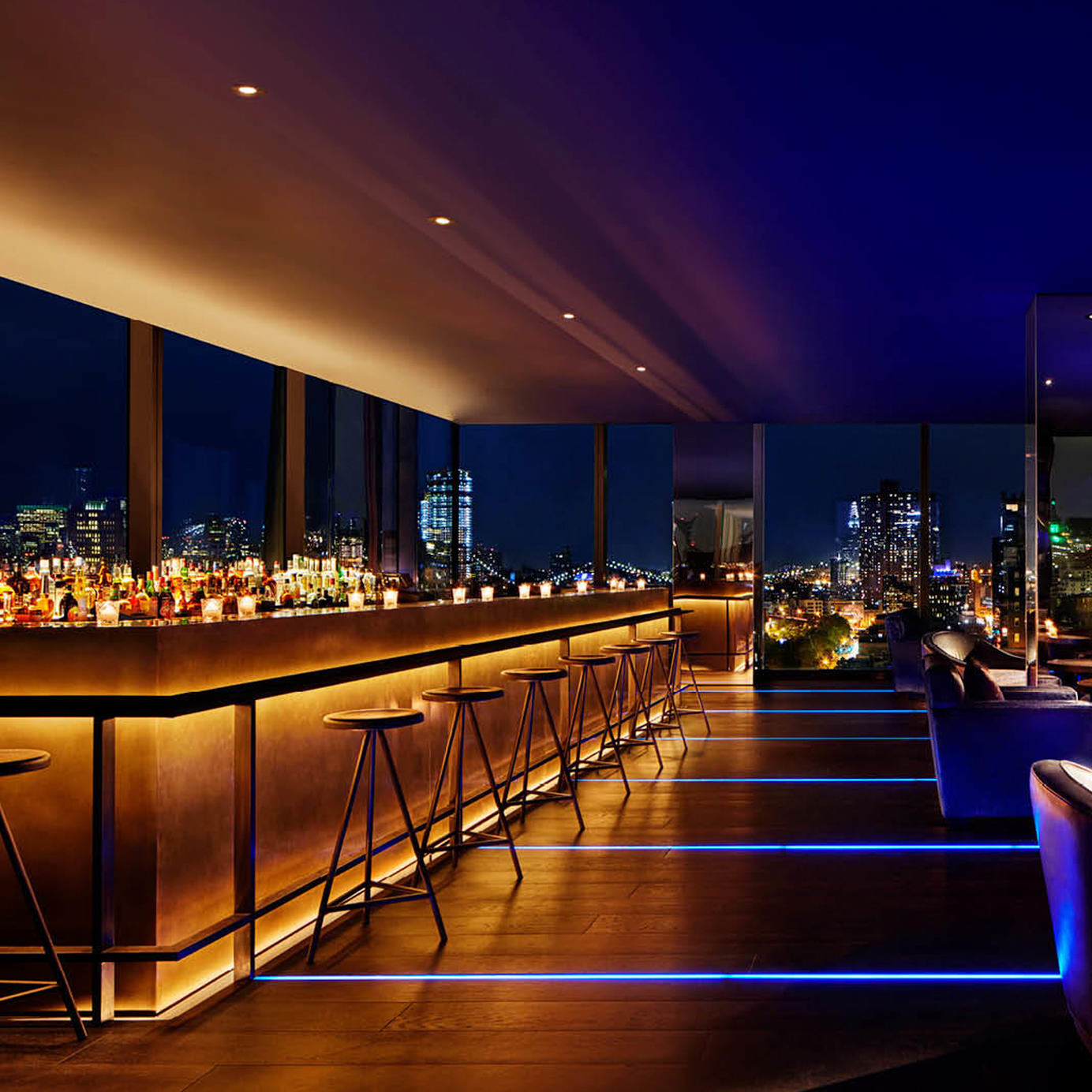“Airbnb is a mortal threat to the U.S. hotel industry.”
This dramatic proclamation was delivered by legendary American entrepreneur, hotelier, and real estate developer Ian Schrager, the mind behind both Studio 54 and our current boutique hotel boom, in a piece for the WSJ online. Schrager, promoting his newly unveiled NYC property Public, counsels that “the only way you can compete with a strong idea is by having another strong idea.” His advice? Hotels need to step up hospitality and make themselves impossible to replicate. This means better design and, most importantly, a hotel bar or restaurant that can succeed as a stand-alone. But can this really help save hotels?
The existential threat of Airbnb is real. Last year, Morgan Stanley Research published a widely reported, evocatively titled study, “Who Will Airbnb Hurt More — Hotels or OTAs? … One Year Later.” The poll of 4,000 travelers found that, in 2015, 41 percent had swapped a night in a hotel for an Airbnb booking. In 2016 that figure rose to 49 percent. Morgan Stanley predicts it will maintain approximately 50 percent in 2017. (As Skift notes, it’s perhaps worth acknowledging that Morgan Stanley is an Airbnb investor.)
In creating Public, Schrager hopes to triage some of that damage by keeping room rates as competitive as possible, and pouring resources into social spaces like the hotel’s (five!) bars, music venue, and the Public Kitchen, a ground-floor restaurant designed by James Beard Award-winning chef Jean-Georges Vongerichten.
Thus far, the plan seems to be succeeding. Public reportedly gets 35 to 45 percent of revenue from its food and beverage outlets, compared to the national average of 24 percent. When I visited on a Wednesday afternoon, the restaurant, bars, and lounge areas were packed; visitors were even using the hotel’s second-floor lounge as an ad hoc office.
In Williamsburg, Brooklyn, “hotel row” includes bars like Westlight at William Vale, the rooftop at The McCarren Hotel and Pool, The Library at The Williamsburg Hotel, and The Ides at Wythe Hotel. All adapted this model, turning their five-block stretch into a nightlife hotspot. According to one publishing industry insider, “the rooftop bar at The Wythe is where I do my best people-watching.”

“Look at what Habita Hotels have done for neighborhoods in Mexico City!” Heather Corcoran, a design writer and former senior editor at Dwell magazine, says of the hotel chain’s role in supporting the Mexican capital’s arts scene. “It’s interesting to see how hotels can help invigorate an area. I’d much rather spend a day in the lobby of a hotel than work from home. There’s something about being surrounded by people that’s inspiring, plus the great design, food, and drink options can make work feel like a vacation — almost.”
“The hotel bar plays an important role in NYC, from the NoMad to the back garden at the Bowery. The Waldorf Cocktail Book certainly makes clear the mutually beneficial relationship,” says David Graver, editor at Coolhunting.com, in reference to the cocktail bible released last year, an homage to the legendary hotel. Though frequently an Airbnb customer, he believes hotel bars often “act as an anchor for a certain traveler.”
Iain Ainsworth, creator of White Line Hotels, a curated selection of boutique hotels dotting the fjords of Norway to the beaches of St. Tropez, feels Airbnb has actually been good for hotels, forcing them to refine.
“‘Where are you staying?’ is one of the first questions asked when on travels,” Ainsworth says. “It says something about you, your provenance, your ambitions, perhaps, and this has to do with the creativity of a hotel — whether their reputation, bar, restaurant, or rooftop terrace. Hotels that excel in creating a sense of the dramatic, attract.”
(We reached out to Airbnb but it declined to comment.)

*
On a recent work trip to Buenos Aires, I booked my first room through Airbnb. From a tiny screen, it appeared to be a cozy flat in the city’s historic center. In actuality, the building’s poorly lit hallways were concerning, the internet barely worked, and I was told at night to pull down metal window gratings for “safety.” More than anything, I felt isolated.
When I noticed what looked suspiciously like bed bug bites, I abandoned my freelance-writer budget and booked a room at a boutique hotel across town with Scandinavian decor and a garden patio bar and restaurant. Entering the lobby, I felt an immediate sense of relief. After thoroughly washing (or throwing out) everything I owned, I went for a drink and ended up chatting with another solo traveler. It turned out she owned her own startup bakery service in San Francisco. We have remained friends.
Sure, the hotel cost almost four times as much as my Airbnb rental. But in that moment no savings could compete with the sense of well being that comes from being surrounded by great company (in a reliably bug-free zone). If hotels can somehow distill that feeling, they can vanquish any threat.
